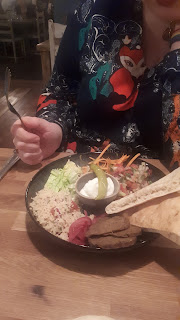Theorists of the Modernist Novel: James Joyce, Dorothy Richardson, Virginia Woolf by Deborah Parsons. Routledge Critical Thinkers.
'Stately, plump Buck Mulligan came from the stairhead, bearing a bowl of lather on which a mirror and a razor lay crossed. A yellow dressing gown, ungirdled, was sustained gently behind him by the mild morning air. He held the bowl aloft and intoned: —Introibo ad altare Dei.' Joyce, James (1990). Ulysses. New York: Vintage Books. p. 3.
I have two interests in this book. I like theory and I enjoy reading James Joyce. To be precise Joyce's Ulysses is my favourite novel and I like a certain level of theory. Without theory all we have is appearance perhaps, theory helps us order and understand reality. Theory is based on concepts and concepts can be productive. By this I mean that concepts allow us to produce alternative ways of life. Lenin argued 'without revolutionary theory' there is no revolutionary movement. I agree. However much as I enjoy theory and find it useful, theory can be used to obscure things, over complicate the simple, and mess with our heads so as to provide power to a minority of theorists who marshal jargon to mystify the rest of us. Yet you can’t do without concepts, mathematics shows that simple number soon involved counter intuitive thoughts, what is true for maths is true in other aspects of reality.
Ulysses, celebrating its first hundred years, is, of course, the story of one day in the life of Leopold Bloom, the everyday hero, in a tale of Dublin in 1904. Modelled on the original ancient Greek story of Ulysses, it present the individual as the hero of their own adventure. Banned and later celebrated, it is a bold literary experiment. I enjoy the prose. Finnegan's Wake is too much for me and the Dubliners too little, Ulysses is just right, at least, for my limited literary patience.
I enjoy a certain level of theory, not too much, not too difficult, not too easy. I have found this series from Routledge (bias warning I am an author with Routledge) extremely useful, good concise, clear guides to important and challenging thinkers.
Deborah Parsons examines Joyce along with Dorothy Richardson and Virginia Woolf as Irish and British representatives of Modernism. Modernism in the novel seems to be a move to showing the chaotic subjectivity of the individual in literature. Woolf in this regard promoted 'stream of consciousness'. Parsons puts these three modernist writers in the context of feminism, nationalism, consciousness and experiment.
Interesting in regard to politics to note Joyce's interest in the Irish Revolution. In regard to the death of the hunger striker Terence McSwinney, who he believed was a distant relative, he wrote a bitter poem attacking the British Empire.Thus Joyce didn't defend Britain but his figure of the Cyclops, the blinkered one eyed Irish patriot, is a warning that Britain wasn't the only enemy. The Conservative nationalism of the Irish State, during the 1920s to 1960s, suggested that any revolution should beware of becoming fossilised into an unthinking essentialism. However a greater danger might be of the critics of flawed anti-imperialism acting to promote imperialism. Orwell warns of the dangers of animal farm, so we wait meekly in our stables, before we are carted off to the slaughterhouse? The debates around Joyce and politics, might point to the big debates around post-modernism and political transformation.
Joyce to my mind is to be enjoyed. Ulysses with a Bloomsday guide to Dublin in hand is a tremendous read. Joyce along with other modernists warns us that human consciousness is not immediately transparent, perhaps pointing the way to other literatures that decentre what it means to be human, moving us away from consciousness to how we are part of the ensemble, are individuality as something fragile.
Woolf is a founding feminist. Perhaps a materialist feminist, the whole point of 'A Room of One's Own' is that only if an individual has an income, a room to write in, and other material resources will they be able to write. Gender cuts away the material support from women to be able to write freely, argued Woolf. Woolf too opens up a number of debates about the effects of gender on prose, a concern too for Richardson, whose diary/novel might be seen as another key feminist text. And Parsons discusses the mixed lessons for literary feminism of James Joyce’s Molly Bloom.'[O]ne great part of every human existence is passed in a state which cannot be rendered sensible by the use of wideawake language, cutanddry grammar and goahead prose' noted Joyce, reproduced by Parsons in the first sentence of her book. She certainly, and perhaps paradoxically, uses cut and dry grammar and go ahead prose to debate the three modernist writers






